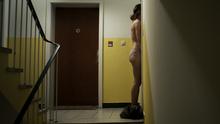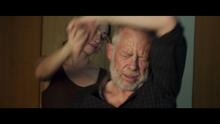19Nov
Eva Trobisch: Everyone Sees a Very Different Movie in This Film
The German director Eva Trobisch in her daring and detailed debut film All Good puts us in the shoes of Janne, a young woman who decides to keep quiet about being raped. Ahead of the Croatian premiere at the 16th ZFF we had a chat with this debut director whose graduation film stole the thunder of many famous directors and won awards at the prestigious festivals in Locarno and Munich.
What happens to Janne in the film is never named. What does exactly happen?
From a judicial point of view, it is a rape. She makes it clear that she doesn´t want to, nevertheless he still sleeps with her. But no inspector is sitting next to them writing the protocol when it happens. That´s why what it is depends very much on the two people involved and they are dependent on each other in the process of defining it.
Why doesn’t Janne use the word rape? Is it easier for her to cope if she classifies it as bad, drunken sex?
Rape is a very charged word in our society. It comes together with a bunch of attributions and very specific ideas how a victim has to feel or react. Images like: the woman is traumatized forever, can´t have sex anymore and should accuse the perpetrator to get justice (often in a long court proceeding, being asked for very private details in public). Janne doesn´t want to go down that road, she can´t identify with that images and ideas. She doesn´t see herself as a victim and has difficulties to see Martin as this classical perpetrator, who needs to be put to prison. Something in her questions why she should give this one and a half minutes bad drunken sex so much space and power over her and her life. And also there is a moment of proud – even in the very particular situation: in the moment he takes over the physical superiority for her the moral one is left. She thinks: okay, bring it on, you can´t harm me more than you harm yourself, you are the one who makes himself guilty by doing it, you pathetic snip. You´re the one who has a problem afterwards.
Janne is a strong woman, yet she decides to keep the rape a secret. Is she trying to avoid judgment or does it have something to do with our societal norms and “Shiny Happy People” mentality?
I think the answer is already given in answer one and two. Still there is a very personal question I want to raise that I don´t have an answer to: On one hand, I think it is a strong move to claim for herself that it is her very individual decision what harms her and what not and how she is going to deal with it. It is an act of self-determination. On the other hand, there is a tendency of women in my generation to misunderstand being strong by the attitude of “I can handle everything, nothing kills me”, having this self-image of being above everything. But at the same time, this attitude constantly pushes them over their own limits. I think somehow both is part of the truth.
It is not things themselves, but our opinion on things that hurt us. This is a stoical saying which suits Janne’s frame of thinking really well. Janne is focused on taking control of things, and not letting bad things happening around her make her loose her cool. Is it because she doesn’t want to be perceived as a victim?
If I had a final answer on this, I wouldn´t have made the film. This is exactly one of the questions and dilemmas that interests me. To what extent is this way of dealing with it very free and contains a possibility of empowerment and to what extent is her way of handling the situation a toxic repression that will cause even bigger problems not only to her?
What about the economical factor? What role does it play, as the perpetrator is the son-in-law of her new boss?
I think they definitely play a role. As everything plays a role. It is a very individual and specific situation that never takes place in a laboratory test tube. Things like this always take place in a system of various conditions. It matters how you feel generally in your life, relationship, working situation, how was your upbringing and social background, who is the one you are assaulted by… And of course, that she just has gone bankrupt and gets this job offer she is very interested in makes her think even more, why should I look back and let this moment prevent possibilities for my life and destroy lucrative options.
Janne tells her perpetrator that she “doesn’t want to make a big thing out of it.” In the end her silence and ignoring the issue causes her and those around her a lot of grief. Did she make the right decision?
I don´t think in right or wrong. I think in simultaneities. I understand her behaviour and her reactions in every minute of the film. That is true for all my other characters too, by the way. She did what she thought was right respectively what she was able to do, due to her character, emotions and situation. That´s what matter for me. I think we are often way too quick. Who are we to judge?
The key issue in your film seems to be one of self-determination. Janne refuses to admit that she isn’t in control of her life and what is happening to her. Can you comment?
I think she controls a lot. She is the one making the decisions. She doesn´t talk to anyone, so she takes other people the opportunity to react appropriately. I don´t make an accuse out of it, it´s her right to stay silent, but still she decides for Piet, for example, what role he is going to play in this whole thing: the role of the clueless innocence. She decides for Martin how they handle the situation. She decides that she accepts the job and stops working on the mutual project with Piet. She decides for Robert how to deal with his wife etc. I think she starts to lose control in the moment she gets pregnant. Her ratio, her intellect, her free will have come to their limits: her body. And in the moment she realizes that the circle of destruction is getting bigger and beyond the responsibility for her own person (Piet, thinking she had an abortion of his child without telling him, Martin having an accident) only then, she is able to stop herself. The wheels of this character that is always in motion, on the run, stand still for the first time, when she realizes that she really starts to harm other people.
You stated in a previous interview that rape is never a monocausal process that happens in a vacuum. Can you elaborate?
That´s is what I meant earlier. It never takes place in a vacuum, it’s always a systemic and complex and – again – very individual thing depending on the people involved and on their concrete life conditions. We tend to give over-all-answers to very specific situations. And to have one answer regarding how to feel and behave for all these very personal experiences is the next assault in my opinion.
The traditional perpetrator-victim relations have been completely inversed in the film. It is almost as if Janne feels sorry for Martin. Can you comment?
Feelings and relations are complex and very dynamic. Why shouldn´t she feel pity? Does someone who did something wrong deserves to have an accident? Isn´t it possible to despise someone in one moment and feel close to him in another one? When they sit together in this changing room in the bowling centre we were surprised how many different things were in the field. Contempt and intimacy, pride and neediness, rejection and attachment.
The character of Martin, the perpetrator is also devoid of stereotypies. He seems to honestly repent about what he did. Are you worried that you might get criticized by some feminists for an overtly sympathetic portrayal of the rapist?
No, I am not. Everyone sees a very different movie in this film, depending on their background and very individual experiences and convictions.









